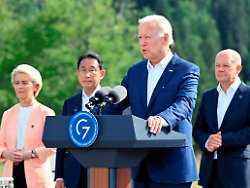“New Silk Road”, but better
G7 want to pump 600 billion into infrastructure
06/26/2022, 7:49 p.m
China has been opening up new trade routes worldwide with the “New Silk Road” since 2013. But the investments often become a trap for countries that accept them, the US says. At the G7 summit, President Biden therefore announced a western alternative worth billions.
The G7 group of leading democracies wants to compete with China with a global infrastructure initiative. At their summit in Bavaria, a “Partnership for Global Infrastructure” was formally launched, announced US President Joe Biden. The project, which was announced last year, is intended to be an alternative to the “New Silk Road” with which China has been opening up new trade routes to Europe, Africa, Latin America and Asia since 2013.
“Together we want to mobilize almost 600 billion dollars through the G7 by 2027,” said Biden, who initiated the project. “And I’m proud to announce that the United States will commit $200 billion in public and private capital to this partnership over the next five years.” According to him, investments in the digital infrastructure are also planned.
Biden added that this is not a charity. “It’s an investment that will pay off for everyone, including the American people and the people of all our countries, and will boost all of our economies. It’s a chance for us to share our positive vision for the future. “
Europe, Japan and Canada are following suit
EU Commission President Ursula von der Leyen announced that Europe would provide 300 billion euros as a contribution to the investment initiative. The projects would be developed together with the countries, she said. “As democracies, we must join forces.”
Japan will provide $65 billion in government and private money, according to Prime Minister Fumio Kishida. In this way, Japan will also promote the construction of airports, ports and railway connections in the Indo-Pacific. Italy’s Prime Minister Mario Draghi spoke out in favor of Western countries investing in gas infrastructure in Africa, for example, but also in the expansion of renewable energies. However, it is important that the gas infrastructure can then also be used for hydrogen. Canada’s Prime Minister Justin Trudeau pledged $5.4 billion.
Investments without a debt trap
A US official said the initiative would target low- and middle-income countries. The goal is investments that are “really needed, but not dictated from outside”. There will be high standards “to ensure that investments do not lead to debt traps,” the government official said. That is the big difference to the Chinese project: The countries involved found that their debt mountains were growing and that the “so-called investments” did not reach the people.
The agenda of the G7 summit, which lasts until Tuesday, will be dominated by the Russian attack and its consequences for the global economy. The communications director of the National Security Council in the White House, John Kirby, had previously stated that China would also be “an important focus”. Last month, US Secretary of State Antony Blinken presented the People’s Republic as the greatest long-term challenge for the international order, despite the acute crisis in Ukraine. China is one of Russian President Vladimir Putin’s few allies.
Import ban on Russian gold
In order to put the Kremlin boss in his place, the seven leading democratic industrial nations of Ukraine have pledged further help. As a further punitive measure, US President Biden announced an import ban on Russian gold. This would take tens of billions of dollars in revenue from Russia, he stressed. Gold is Russia’s second most important export after energy.
In contrast, the European nations, in particular, were cautious about the US proposal to impose a price cap on Russian oil. A clear idea of the direct effects and possible side effects is needed, said EU Council President Charles Michel on the sidelines of the G7 summit. Not only in the EU, but also in the USA, the high fuel prices are currently a big issue.
Concrete commitments are expected from the G7 countries in the fight against famine, which is particularly prevalent in East Africa and is becoming even worse in view of rising grain prices. Ukraine and Russia are among the world’s top grain exporters. Ship deliveries to Ukraine are currently being prevented by Russia.
